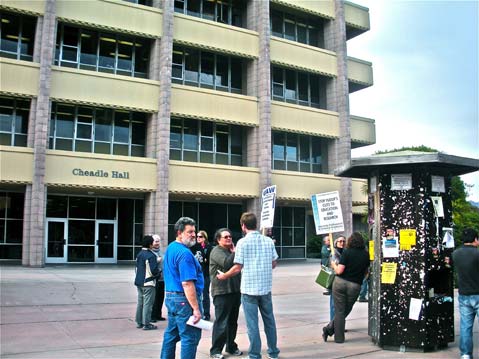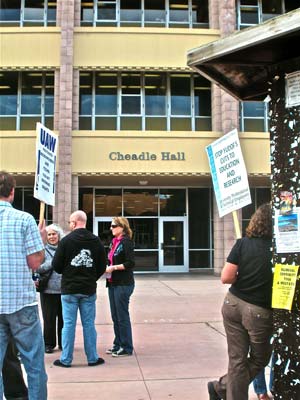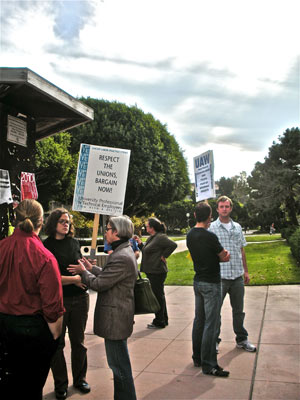UC Budget Numbers Don’t Add Up, Scholars Claim
Researchers, Technicians, Scholars Cite Increased Grant Revenue

Cheadle Hall saw its second picket of the month on Tuesday, December 15. But this was not like other recent protests. The same event occurred from noon till 1 p.m. on every University of California campus, and was aimed mainly to address concerns of researchers, technicians, and postdoctoral scholars who argue that the UC is hiding behind the budget crisis. Huge increases in grant revenue, they said, are not appropriately reflected in the current condition of UC employees and students.

While faculty, staff, and students remain united in their concerns, only faculty and staff were on campus December 15, as students had finished the quarter the previous Friday and dispersed for the holidays. (Meanwhile, professors have until December 16 to submit grades, and other workers have plenty to do while students are on break.) The participating faculty and staff tried to raise awareness of fellow UC employees and the public alike, about their gripes with the way the UC is handling the cut in state funding. They did so in a more articulate, less furious-chanting sort of way than had been pursued previously.
The actors in this event include the UAW 5810, which is the union for more than 6,000 postdoctoral scholars, and the UPTE/CWA 9119, the union for more than 9,000 researchers and technicians at the University of California. Their “Bargaining Update,” a detailed flyer distributed during the protest, outlined their argument best: It urged the University of California to “stop hiding behind the state budget crisis and use increasing federal research funds to improve salary and benefits for 15,000 employees who make UC a world leader in research.”
The protestors chose Cheadle Hall because it houses the office of Michael Witherell, UCSB’s Vice Chancellor for Research.
Jennifer Rogers represented the postdoctoral scholars at the event. “The numbers don’t add up,” she said. “Grant revenue has more than doubled since 1997. Indeed, grant revenue is the main funder of UC research, and it has more than doubled in the past 12 years, from $1.37 billion in 1997 to $2.98 billion in 2009. Post docs do cutting edge research. The minimum salary is $37,400, and there should be increases from there – that’s not enough for scholars doing cutting edge research.”
Rogers continued to explain that the biggest different between the Santa Barbara campus and other UC campuses is the cost of living. “If they want researchers to come here, they need to offer a competitive amount of money. We are an asset,” she said.

UCSB sociology professor Howie Winant took a break from grading papers to attend the protest. He said he believes that the increases in students’ tuition and fees are the most important problem, but he is also concerned for faculty and staff. “Some furlough is happening on every academic level,” he said. “Funding has gone down for everything. There are already faculty leaving to go to other universities where they will be supported better.” Winant cited administrators’ “edifice complex” – their obsession with building, even at the expense of struggling students and employees.
Rodney Orr, part-time union representative at UCSB, and UPTE statewide legislative director, was also present at the picket. A retired machinist at UCSB’s College of Engineering, he is no longer directly affected by the way that the UC is dealing with the budget crisis, but he’s still involved. He said he originally hired on with the UC because he believed in its mission statement. Orr explained how the bigger picture indirectly affects him along with other Californians: “They could help to stimulate the economy through the millions and millions of dollars of grant money that they receive. But they are only laying off people, cutting salaries, and furloughing, which only hurts the economy and research as well.”
The two unions, along with students from all UC campuses and others who are affected, plan on future action. Specifically, they will march on Sacramento in March, attend all Regents meetings, and attend the legislative hearings on the vision for higher education, contributing with testimony.



